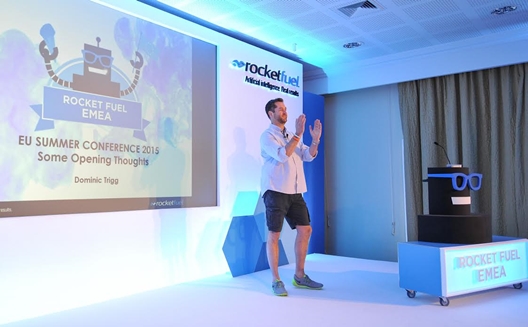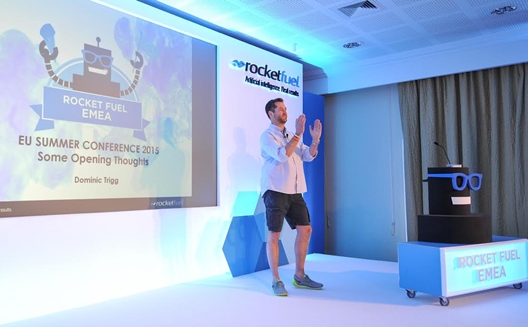Programmatic marketing, what is it and why entrepreneurs need it

There is no doubt that marketing and advertising is now an essential part of any entrepreneur's business strategy.
Even if the funding a startup receives is small, part of it has to be dedicated to marketing, and there are a lot of options out there.
The marketing strategy often adopted is via launching a social media campaign or opting for word of mouth within an ecosystem.
The last few years though have seen a new method of advertising gain popularity: programmatic marketing, or the use of data to decide which digital ad spot to buy and when. It’s considered to be one of the fastest growing phenomenons in the media and advertising industry today.
To help explain this phenomena and see what opportunities it may offer MENA-based startups, Wamda met Rocket Fuel’s Dominic Trigg, senior vice president and general manager of their Middle East arm.

Dominic Trigg speaking at Rocket Fuel's 2015 summer
conference. (Images via Rocket Fuel)
Wamda: How do you define programmatic marketing?
Dominic Trigg: There are many definitions, but, put simply, it's a way to automate the buying process and the supply chain available for the advertiser. For example, instead of resorting to one publisher [of the ad], we can resort to several at the same time, and base our decision on the [simultaneous] behavior of users on several publishers' websites at a specific time.
And perhaps what differentiates Rocket Fuel is its use of artificial intelligence [AI] to make these choices. So instead of resorting to a data analyst who sits and analyzes the data, we have machines that make decisions based on hundreds and millions of information.
Wamda: What are the main features of this marketing strategy?
Trigg: Perhaps the most distinguishing thing about programmatic marketing is that it's an open marketplace which [users] can access and use the 'publishers inventory', which is usually available for the buyer or the ad company.
For example, suppose we want the ad on the front page of the publisher like Yahoo!. We [either] take the decision or we offer a bid on behalf of our customers on the amount we're willing to pay to have the ad, depending on millions of immediate hits. Programmatic marketing works like an automated market, like a stock market. If I had a petroleum company and I wanted to sell shares, I will to do according to the common valuation and prices.
There is no doubt that technology plays an important role here, because it allows us to determine the user behavior, commitment and the amount they can afford to pay. It also helps us determine the return on investment [ROI] and the effect of the market on it.
We also shouldn’t forget that this technology helps us analyze huge data, like keeping track of cookies, IP addresses, geographical area, day times, weather conditions and buying behavior…meaning different data that determine if your viewers match your target and benefit you advertiser.
Wamda: But is this technology and the 'big data' available for entrepreneurs?
Trigg: The answer might be 'no', especially since big data needs an advanced technology to analyze and benefit from it comprehensively. We resort to AI to understand these large data. We needed about seven to eight years to develop [this intelligence], and it wasn't easy. They [clients] will definitely need to work with companies specialized in analyzing this kind of data. Campaigns may cost up to $200,000.
Wamda: You mentioned that you were dealing with clients in the region. How would you describe this experience? What differentiates it, and what does it lack?
Trigg: This region definitely presents many opportunities, and the available numbers prove this.
According to our numbers, Saudi Arabia provides 31 million daily 'display banners' for sale, followed by UAE with 28 million, and then Qatar with 10 million. This reflects a huge purchasing capacity in the open marketplace.
Concerning our customers, most of them are interested in ROI, and they are fully aware that programmatic marketing might be the solution for that. But the bigger problem is that most publishers' inventories are not available in the region, but through a third party, which inhibits the open exchange.

Selfie time.
Wamda: Being an expert with large corporations, what do you advise entrepreneurs who want to adopt programmatic marketing in the region?
Trigg: Meet all the players, and focus on the effect of ads on your business, and work on them. This concept [of programmatic buying] is no doubt growing and has proved that it will develop in several fields. Look for opportunities and gaps in the market. And don't be afraid to consider campaigns and strategies that are successful in other parts of the world, because regions often mirror each others And sometimes, it's better for you to be in the B-list, because inventing the wheel isn't what counts; it's realizing what you should do and how it fits with your market.


